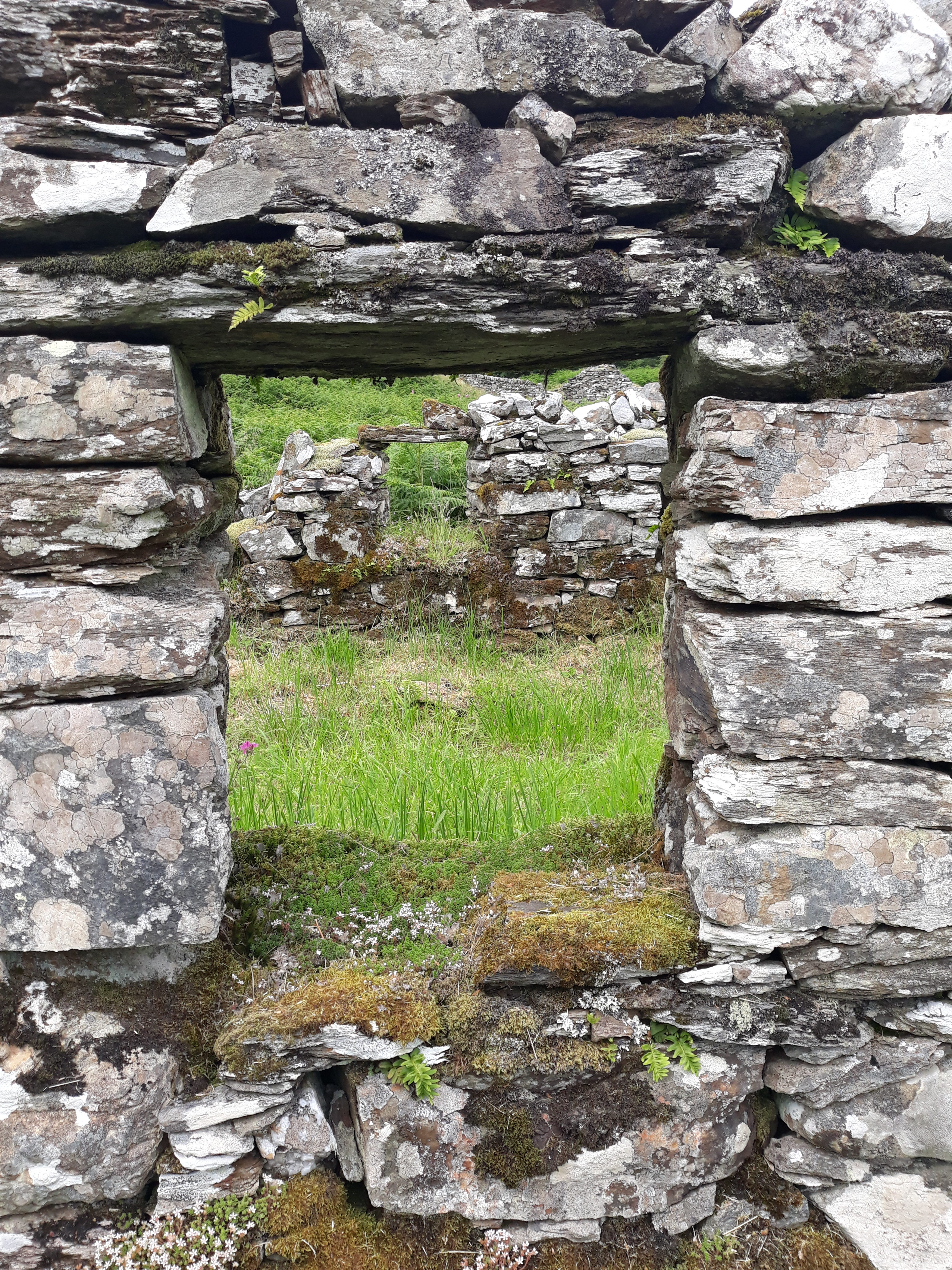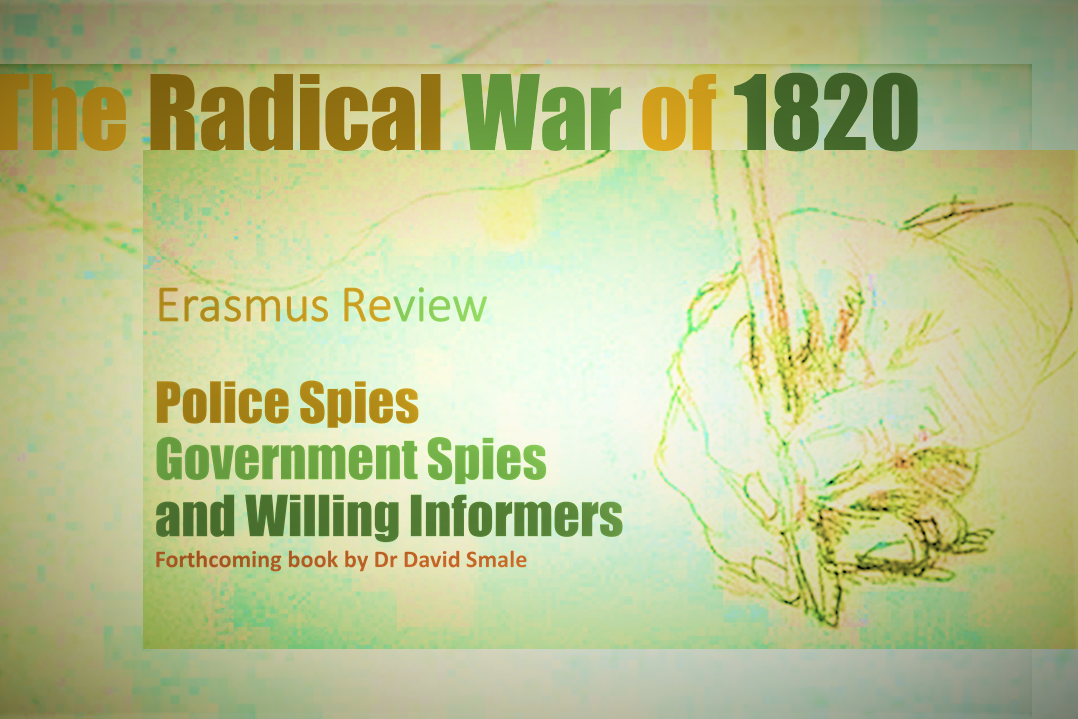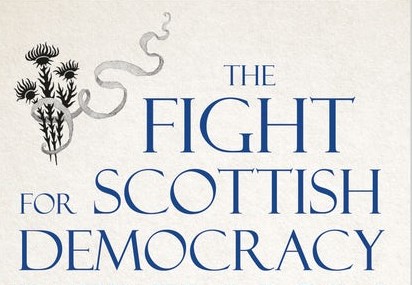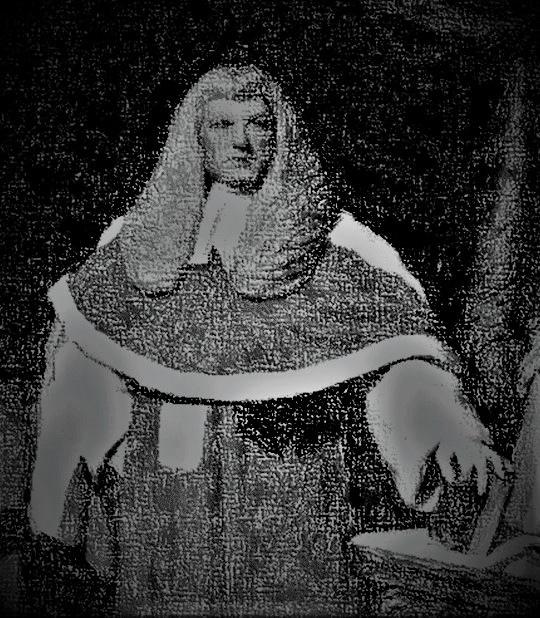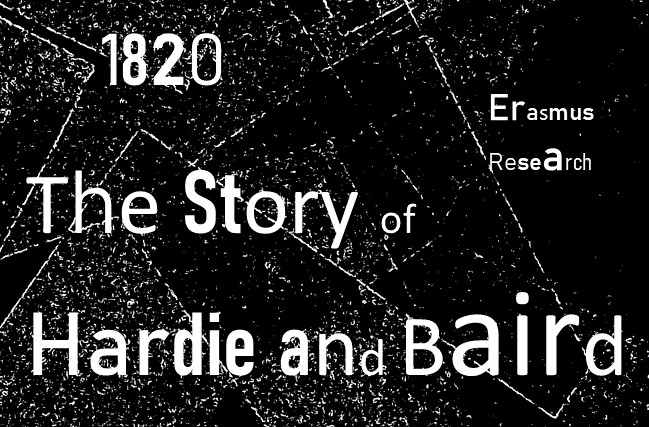This is the first section of Chapter IV of the serialisation, the wording reproduced exactly as it appeared in the Stirling Sentinel, on Tuesday 5th March 1889.
CHAPTER IV – 1820
THE “TREASONABLE ADDRESS” – ALARM IN GLASGOW – THE DREAD OF CIVIL WAR – THE REV. DR CHALMERS’ PRAYER – PROCLAMATION BY THE GLASGOW MAGISTRATES – THE SECRET HISTORY OF THE “TREASONABLE ADDRESS” – ANDREW HARDIE’S FIRST APPEARANCE ON THE SCENE – AN UNLUCKY RENCONTRE – A ZEALOUS J.P. AND HIS REWARD.
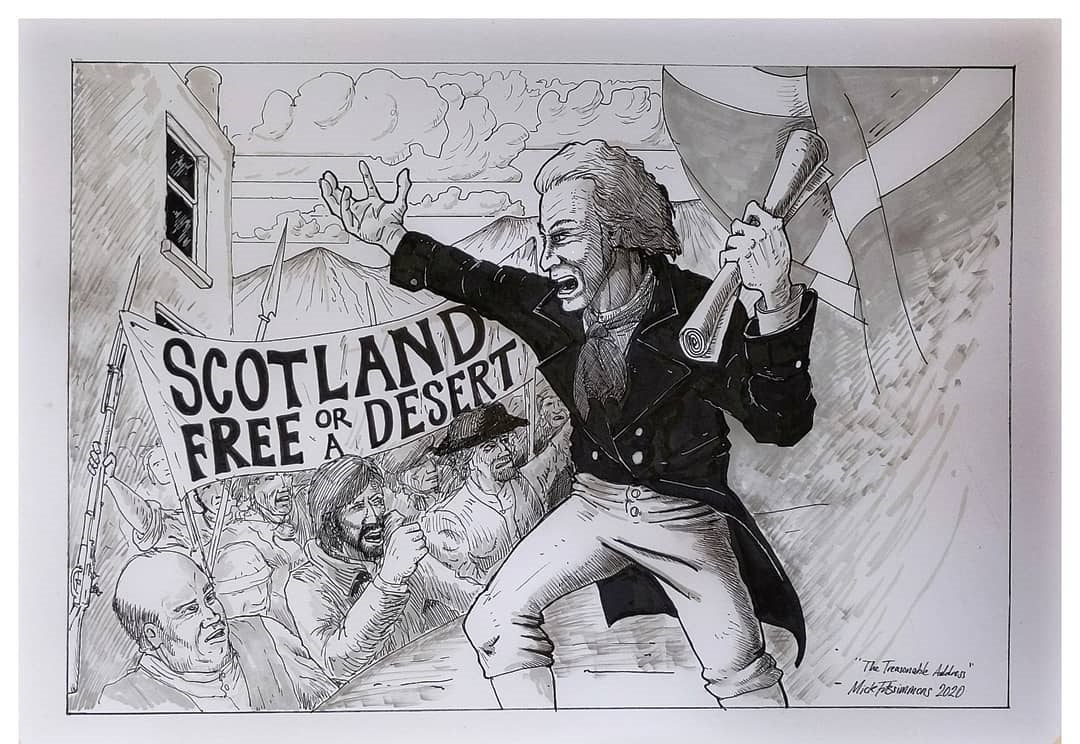
The Treasonable Address by Mick Fitzsimmons
You can check out his work at mickfitzsimmons_art or click on the Image
The following is the text of the “Treasonable Address” which alarmed the country on the morning of Sunday, 2nd April, 1820:-
Address to the Inhabitants of Great Britain and Ireland.
Friends and Countrymen, – Roused from the torpid state in which we have been sunk for so many years, we are at length compelled, from the extremity of our suffering, and the contempt heaped upon our petitions for redress, to assert our rights at the hazard of our lives; and proclaim to the world the real motives, which, if not misinterpreted by designing men, would have animated all ranks – have reduced us to take up arms for the redress of our serious grievances.
The numerous public meetings held throughout the country has demonstrated to you that the interests of all classes are the same; that the protection of the life and property of the rich man is the interest of the poor man, and in return, it is the interest of the rich to protect the poor from the iron grasp of despotism; for, when its victims are exhausted in the lower circles, there is no assurance but that its ravages will be continued in the upper; for once set in motion it will continue to move till a succession of victims fall.
Our principles are few, and founded on the basis of our constitution, which were purchased with the dearest blood of our ancestors, and which we swear to transit to posterity unsullied, or perish in the attempt. Equality of rights (not of property) is the object for which we contend, and which we consider as the only security for our liberties and lives.
Let us show to the world that we are not the lawless, sanguinary rabble, which our oppressors would persuade the higher circles we are, but a brave and generous people determined to be free. Liberty or death is our motto, and we have sworn to return home in triumph or return no more!
Soldiers, shall you, countrymen, bound by the sacred obligation of an oath to defend your country and your King from enemies, whether foreign or domestic, plunge your bayonets into the bosoms of fathers and brothers, and at once sacrifice, at the shrine of military despotism to the unrelenting orders of a cruel faction, those feelings which you hold in common with the rest of mankind? Soldiers! turn your eyes towards Spain, and there behold the happy effects resulting from the union of soldiers and citizens. Look to that quarter and there behold the yoke of hated despotism broke by the unanimous wish of the people and the soldiery, happily accompanied without bloodshed. And shall you, who taught these soldiers to fight the battles of liberty, refuse to fight them of your own country? Forbid it, Heaven! Come forward then at once, and free your country and your King from the power of those that have held them too long in thraldom.
Friends and countrymen, – The eventful period has now arrived when the services of all will be required for the forwarding of an object so universally wished, and so absolutely necessary. Come forward, then, and assist those who have begun in the completion of so arduous a task, and support the laudable efforts which we are about to make to replace to Britons their rights consecrated to them by Magna Charta and the Bill of Rights, and sweep from our shores the corruption which has degraded us below the dignity of man.
Owing to the misrepresentations which have gone abroad with regard to our intentions, we think it indispensably necessary to declare inviolable all public and private property. And we hereby call upon all Justices of the Peace, and all others, to suppress pillage and plunder of every description, and to endeavour to secure those guilty of such offences, that they may receive the punishment which such violations of justice demand.
In the present state of affairs, and during the continuation of so momentous a struggle, we earnestly request all to desist from their labours from and after this day, the 1st of April; and attend wholly to the recovery of their rights, and consider it as the duty of every man not to recommence until he is in possession of these rights which distinguish the free man from the slave, viz., that of giving consent to the laws by which they are to be governed. We, therefore, recommend to the proprietors of public works, and all others, to stop the one and shut up the other until order is restored, as we will be accountable for no damages which may be sustained, and which, after this publication, they can have no claim to.
And we hereby give notice to all those who shall be found carrying arms against those who intend to regenerate their country, and restore its inhabitant to their native dignity, we shall consider them as traitors to their country and enemies to their King, and treat them as such.
By order of the Committee of Organisation for forming a Provincial Government.
Glasgow, April 1, 1820.
Britons – God – Justice – the wishes of all good men, are with us. Join together and make it one cause, and the nations of the world shall hail the day when the standard of liberty shall be raised on its native soil.
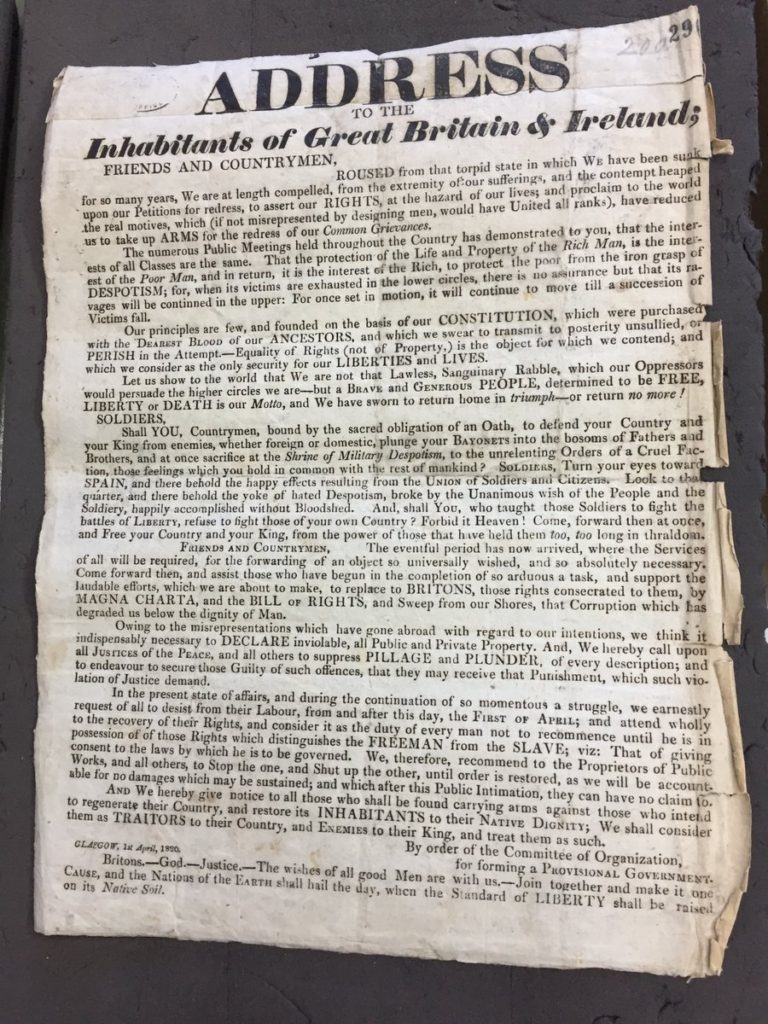
Read in cold blood, and at this distance of time, the above lengthy address strikes us as mere bombast, sound and fury signifying nothing; but at the time of its appearance it was really alarming, and though dated on All Fools’ Day, it was no joke. The country was in a state of agitation and terror. All kinds of rumours were afloat of a contemplated insurrection in England and a simultaneous uprising in Scotland, and the publication of this address was regarded as the signal for a Revolution.
That Sunday was one of the most exciting days Glasgow ever saw. The people going to and coming from the church crowded round the places where the address was posted up, and it was the general theme of discussion. The Rev. Dr Chalmers was then minister of St John’s in the Gallowgate, and in the afternoon the church was crowded to excess. In one of his prayers the Dr, amid perfect stillness, offered up this petition – “O mighty Lord and Governor of the Universe! Preserve this kingdom, we humbly beseech thee, from the horrors of civil war, apparently approaching us in this city”.
A feeling of uneasiness and anxiety prevailed throughout the whole city, everybody thinking of preparations for their own safety when the Provincial Government came into power. In the afternoon and at night, the entry of troops of hussars gave affairs a most warlike aspect. The Magistrates sat up all night and next day (Monday), they issued a proclamation ordering all shops to be shut at six o’clock p.m. until tranquillity was restored, all the inhabitants being enjoined to retire to their houses not later than seven o’clock. Strangers had to withdraw before that hour, and parties or groups of people standing together or walking in the streets were to be deemed disturbers of the peace and dealt with accordingly. If the lamps were put out, the inhabitants were desired immediately to illuminate their windows with as much lights as they could conveniently command.
The second part will be published online on Thursday 23rd April
to be continued…

